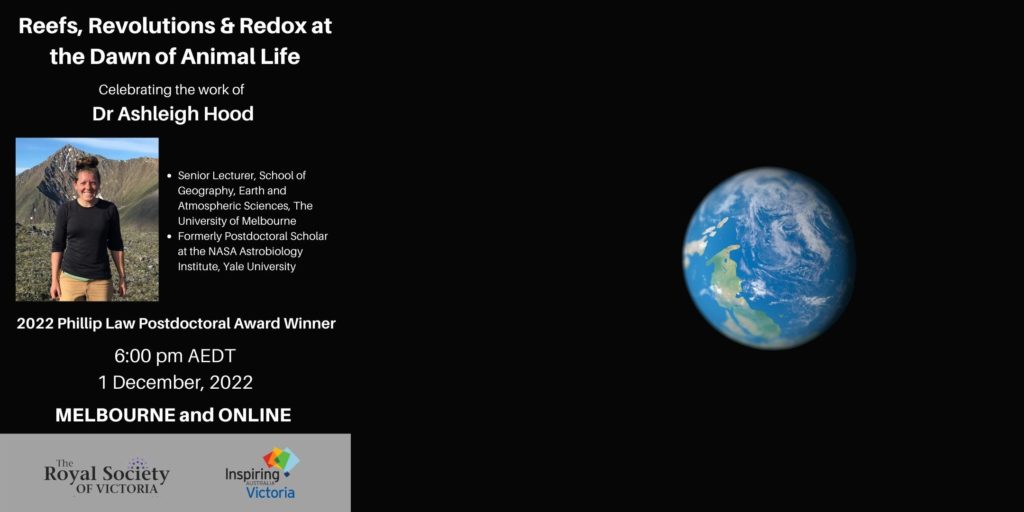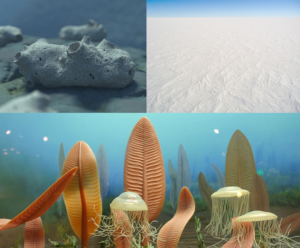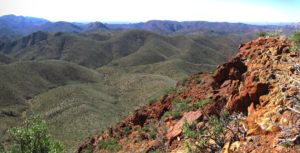Reefs, Revolutions & Redox at the Dawn of Animal Life
The 2022 Phillip Law Postdoctoral Award Lecture


By Jack Jackie Pomi – Own work, CC BY-SA 4.0
Earth’s oceans have hosted the evolution of complex life throughout much of the planet’s history. However, the link between evolving marine organisms and their physical habitats is often not well understood, especially on the early Earth. The “Cambrian explosion” of animal life around 540 million years ago has traditionally defined the boundary between the strange environments of the early Earth and the recognisable animal ecosystems of our current Era.
More recently, the evolution of animals and other complex life has been understood to have originated much earlier, in the preceding Neoproterozoic Era (~1000-540 million years ago). From enigmatic reef systems to sandy seabeds rich with jellyfish-like ‘Ediacaran biota’; these Neoproterozoic marine environments were unusual but diverse habitats. Sedimentary rocks which were deposited in ocean basins during and after this ‘dawn of animal life’ record the complex links between ancient environments, climate, seawater conditions and biological evolution. In particular, the oxygenation of Earth’s surface during this time had profound effects on almost every aspect of biogeochemical cycling on Earth and is thought to play a major role in shaping the biosphere of our modern world.

However, the timing of the oxygenation of Earth’s surface environments and its link to biological evolution remains contentious. This talk will chart the tumultuous history of reefs and redox (from “oxygen reduction,” indicating a biochemical reaction involving changes to the oxidation states of organisms and their supporting substrates) through this time, presenting a series of studies showcasing exciting new perspectives on marine environmental conditions and their link to ecosystem complexity. In particular, a suite of well-preserved marine carbonates has revealed new details about oxygenation of the Earth’s oceans in the Neoproterozoic and Palaeozoic that challenge the traditional view of a unidirectional rise of oxygen through Earth’s history. This perspective abandons the oceans, and instead implicates the importance of the greening of the continents around 400 million years ago, suggesting that land plants are the true engineers of our modern, oxygen-rich planet.
About the Speaker
Dr Ashleigh Hood is the 2022 winner of the Phillip Law Postdoctoral Prize in Category II: Earth Sciences. She is an ARC DECRA Fellow and Senior Lecturer in the School of Geography, Earth and Atmospheric Sciences at the University of Melbourne. Prior to this she was a NASA Astrobiology Institute postdoctoral scholar at Yale University in the United States.
Her research seeks to improve our understanding of Precambrian marine environments and the evolution of the early Earth’s surface environments through the Neoproterozoic Era to more recent times, using multidisciplinary techniques on marine carbonates from ancient reef complexes. To do this she integrates sedimentology, stratigraphy and geochemistry in both field and lab work.
Dr Hood is the inaugural winner of the Phillip Law Postdoctoral Award in Category III: Earth Sciences, recognising excellence in scientific research by an early career researcher in the years following attainment of their doctorate from a Victorian research institution. Her Award will be conferred following her lecture by Mr Rob Gell AM, President of the Royal Society of Victoria.






